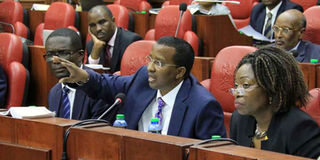Forming new electoral body need not be a matter of life and death

From left: Independent Electoral and Boundaries Commission Chief Executive Officer Ezra Chiloba, Chairman Isaac Hassan and Vice-Chairperson Lilian Mahiri-Zaja before a joint parliamentary select committee on the body at Parliament Buildings on August 2, 2016. PHOTO | JEFF ANGOTE | NATION MEDIA GROUP
What you need to know:
For its part, Jubilee insisted that the Constitution had to be followed to the letter, which, by the look of things, would have taken us on a runaround up to the middle of next year.
There had to be a middle ground, a meeting point, and this is what happened.
A joint panel of parliamentarians led by Senators Kiraitu Murungi and James Orengo, both eminent lawyers and former colleagues in the fight for the second liberation, sat with their teams and the electoral commissioners and agreed on the most important part of their mission: how to eject the commissioners from office with dignity.
The legal world is a jungle in which the rest of humanity often gets lost. It is also a House of Babel, which utterly bewilders the uninitiated, especially as astute lawyers always use arcane language whose very purpose seems to be to obscure common sense. It is like trying to understand what a doctor means by studying his handwritten notes; until he tells you directly that all you are ailing from is simple flu, you might think you are dying.
Put four or five lawyers together and you might think the country is suffering from an incurable disease, and even then they will never agree amongst themselves which one.
Take the issue of the Independent Electoral and Boundaries Commission. For quite a long time, everyone knew that its commissioners would have to go, the only question being in what manner.
Had the lawyers who were supposed to solve that riddle long ago sat with the commissioners the way they did this week without the animosity, the same solution would have been arrived at sooner, saving the country months of tension, accusations and mud-slinging. Almost everyone agreed that the IEBC’s tenure was untenable after the Cord alliance took to the streets, arguing that a referee that had bungled the last election could never be trusted to conduct the next.
ERECT OBSTACLES
If you check carefully, the lawyers in both Cord and Jubilee were the first to erect as many obstacles as possible to this inevitable outcome before politicians took over.
First, Cord insisted that the process of kicking out the commissioners would have to be done outside Parliament. If not, they argued, the “tyranny of numbers” would hold sway and exonerate the commission from any wrong-doing, thus allowing it to preside over next year’s elections.
In this, Cord was to be proved right because in the end, the parliamentary Justice and Legal Affairs Committee did find that the accusations against the IEBC held no water.
For its part, Jubilee insisted that the Constitution had to be followed to the letter, which, by the look of things, would have taken us on a runaround up to the middle of next year. There had to be a middle ground, a meeting point, and this is what happened. A joint panel of parliamentarians led by Senators Kiraitu Murungi and James Orengo, both eminent lawyers and former colleagues in the fight for the second liberation, sat with their teams and the electoral commissioners and agreed on the most important part of their mission: how to send the commissioners home with dignity.
Now the next field of battle will shift to how to choose the panel that will interview and shortlist the names of the next lot of electoral commissioners. Kenyans can only hope the process will not take the rest of the year.
We must find a way out of this maze without too much contention and waste of time. Not everything must be reduced to a life-and-death struggle.
***
Devolution Cabinet Secretary Mwangi Kiunjuri wants counties to get more money for development because what they do get is inadequate. Many governors have been harping on the same theme for long without answering some basic questions. For instance, whose fault is it that some county governments are using two-thirds of their allocations for salaries? How much revenue do they generate locally? And how much of the money given is frittered away on trivial pursuits?
Earlier in the week, it was reported that the Kisumu County government had sponsored a five-day trip to Rwanda for 195 boda boda riders to learn how they can improve their business. Now, I have no problem with boda boda riders. They have become a vital part of Kenya’s transport landscape, and most earn an honest living ferrying people and goods to even those areas inaccessible by conventional means. But why on earth would they need to fly all the way to Rwanda to learn a business they already know better than any Rwandan alive?
It would be interesting to know how much money will be spent on each in this extravagant joy-ride.
It would have been a lot more exciting if these guys had taken the road—the learning experience would have been immense and the PR publicity for re-election purposes invaluable. In the future, use a little more imagination, Governor Jack Ranguma.




